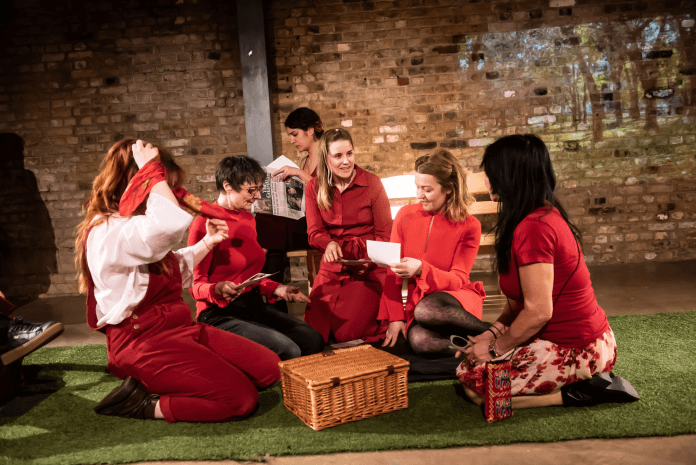Searing synth from Laura Brannigan’s 80s hit ‘Gloria’ blasted around the studio to open It All Comes Back. The music introduced the play by the Arcola Women’s Company’s well, surrounding the audience with hazy, nostalgic tones as the lyric “you really don’t remember?” is repeated.
As part of the Creative Disruption Festival 2020, the play explores memory loss and the sensation of losing pieces of oneself. The festival, running until 15 March, showcases Arcola’s community companies through a variety of new and classic theatre.
A diverse cast of women thread together collections of experiences in this powerful exploration of the female mind. The intimate studio setting effectively draws the audience into the piece, making you feel like part of the narrative. Set and props are minimal, but deployed effectively to show a change of place or person. The projections used as a backdrop were slightly sporadic and unclear on one half of the brick wall, something which distracted from the action a few times and made it difficult to work out exactly what was being displayed.
Multiple actresses take on the mantle of Her, an every-woman character who appears in a red coat and with a red bag, disoriented and unable to figure out where she is. She travels through her memories, visibly uncomfortable with how little she can piece together about certain moments in her life. At times, the anguish of the woman in the red coat was palpable.
In a particularly vivid scene, an acoustic recording of Amy Winehouse’s ‘Valerie’ plays as the ensemble dances. As Her tries to navigate the writhing bodies, presumably at a club or party, arms block her path with an increasing frequency. Her frustration and anxiety are clear to see as she shuts her eyes tightly and attempts to make herself smaller. So many women have felt the same mental block when trying to navigate an unfamiliar situation – that no matter which way you turn, there will be an obstacle.
 The story offers some relatable sketches, derived from the experiences of the company, which get healthy laughs from the audience. The job interviews segment mirrors the experiences so many people have: flailing to find that third flaw or having to describe the small-but-extremely-promising company you worked for or being told the pay is far below your worth. By interweaving lightness with seriousness, the play reminds its audience that memories are fleeting, and that our minds could turn on us at any minute.
The story offers some relatable sketches, derived from the experiences of the company, which get healthy laughs from the audience. The job interviews segment mirrors the experiences so many people have: flailing to find that third flaw or having to describe the small-but-extremely-promising company you worked for or being told the pay is far below your worth. By interweaving lightness with seriousness, the play reminds its audience that memories are fleeting, and that our minds could turn on us at any minute.
Performances by Teresa Reyes and Maria Goncalves during a scene set in a gallery were particularly powerful explorations of the binds on women. Frames held by the actresses mean you view the profile they want displayed, but this was effectively disturbed as they weave themselves in and out of them. Reyes’ monologue as one of Tamara de Lempicka’s paintings demonstrates the capacity for female creatives to turn the male gaze on its head. Her powerful delivery capturs the sense of ownership Lempicka gave her subjects and explored in her personal life as a bisexual woman.
Goncalves ends the gallery scene with a thought-provoking monologue from the words of author Doris Lessing. The discussion of the power we allow others to have over us through self-hatred feels incredibly relevant in an era where criticism floods the brains of women of all ages.
What works so well about this piece wis the pairing of ordinary experiences with the unimaginable pain of memory loss and confusion. The way Her seemed to be losing her mind as a landlord tries to pass off a single room as a double flowed neatly into the story of a young woman going on a bus in the wrong direction and losing something precious. No matter the age or race of the woman speaking to the audience, the struggle they face feels as though it could happen to anybody at any moment. Shouts of “slut” are directed at a teenager, but there is no doubt that many of the older women in the audience had felt that same sting of judgement.
The piece was well-crafted if unpolished, but the rough edges of some sections should not put you off. In just an hour, the ensemble creates a strong emotional connection that leaves you pacing over your most treasured memories in the hope that it will stop you from forgetting.
- It All Comes Back closes on 6 March. Tickets are £15 from www.arcolatheatre.com


